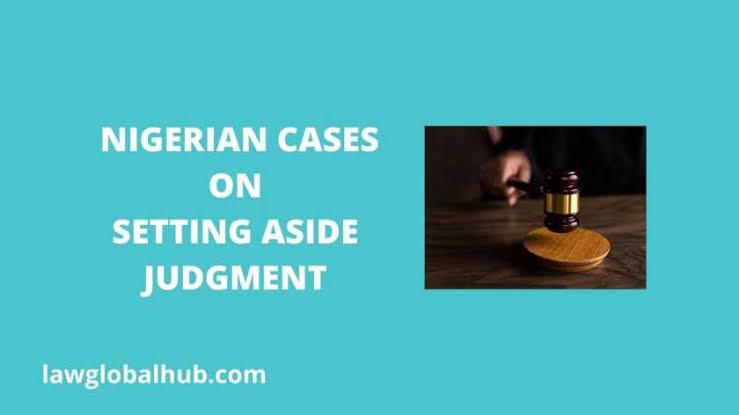Nigerian cases on Setting aside Judgment
Below are some Nigerian cases with rationes relating to setting aside the judgment of a court.
Can a court set aside its own judgment?
Ikpong v. Udobong (2007) 2 NWLR (Pt. 1017) 184
A court of law reserves the right to set aside its judgment which was given otherwise than on the merits upon good grounds shown. The principles in respect of the right of a court to set aside a default judgment is that unless and until the court has pronounced a judgment on merits or by consent it retains the power to set aside its own default judgement. The power to do so is discretionary and the discretion has to be exercised judiciously.
CHUKWU v. CUSTOMARY COURT UMUNUMO EHIME MBANO LGA & ORS (2014) LPELR-23813(CA)
“Finally on the holding of the Court below that it had no power to set aside the proceedings of the Customary Court because that Court was merely acting on the directive of the President of the Customary Court of Appeal of which he (the Learned Customary Court of Appeal Justice) who wrote the Judgment now on appeal was a member of the Court; a similar situation occurred in Cash Affairs Finance Ltd. & Anor V. Inland Bank (Nig.) Plc (2000) 5 NWLR (PT. 656) 568 at 582 and Obadina, JCA, relied on the English case of Craig V. Kanseen (1943) K.B. 256; Per Lord Greene who stated the position of the law thus:
“Those cases appear to me to establish that a person who is affected by an Order which can properly be described as a nullity is entitled ex-debito justitiae to have it set aside… so far as procedure is concerned, it seems to me that the Court in its inherent jurisdiction can set aside its own Order, and that it is not necessary to appeal from it.” Per IGNATIUS IGWE AGUBE, JCA
Principles governing setting aside a judgment
OLUFUNMISE v. FALANA (1990) LPELR-2616(SC)
“The law on setting aside a judgement obtained by fraud is very well settled. It is not in doubt and the elements of fraud to be proved to entitle a claimant/plaintiff to succeed are clear and precise. The learned authors of Halsbury Laws of England 2nd Edition Vol. 22 page 790 set out the law in paragraph 1669 as follows: “A judgement, which has been obtained by fraud either in the court or of one or more of the parties, can be impeached by means of an action which may be brought without leave and is analogous to the former chancery suit to set aside a decree obtained by fraud.
In such an action, it is not sufficient merely to allege fraud without giving any particulars, and the fraud must relate to matters which prima facie would be reason for setting the judgment aside if they were established by proof and not to matters which are merely collateral. The Court requires a strong case to be established before it will allow a judgment to be set aside on this ground, and, unless the fraud alleged raised a reasonable prospect of success and was discovered since the judgment complained of, the action will be stayed and dismissed as vexatious.” – Per ANDREWS OTUTU OBASEKI, JSC
As to a Final Judgment
CHIEF L.L.B. OGOLO V JOSEPH T. OGOLO LER (2006) SC 46/2002
“It is settled law that a judgment given at the end of a normal trial, after hearing evidence of both parties and submissions of counsel on the relevant issues of facts and law, is on the merit of the action and also a final judgment which the court concerned is incapable of setting aside except for fundamental defects that go to the jurisdiction of the court. Where the judgment is final and the court that enters it has no jurisdiction to set same aside having thereby become funtus Officio, the only way to challenge it or remedy any defect therein is by appeal to a superior court.” – Per. W. S. N. ONNOGHEN, JSC
Difference between “setting aside” and “review”
Fapa Co. Ltd. v. O.W.C. Ltd (2017) 12 NWLR (Pt. 1579) 169
setting aside a decision of a court ex debito justitiae and reviewing a decision of court are two distinct and separate things. The two cannot be used interchangeably. setting aside means to annul or vacate, while review connotes to reconsider, inspect or re-examine a subject or thing. setting aside of a decision only calls for an evaluation of whether the grounds adduced, which are usually extrinsic the decision itself, are valid in order to result in an annulment or vacation of the decision. Review of a decision, however, involves a consideration of reasons and factors that are intrinsic in the decision and whether after such a reconsideration, re-examination and inspection, there would be a need to vary or alter the decision.
A court cannot review the decision of a court of co-ordinate jurisdiction, but it definitely has the competence to set aside the decision. In other words, review of a judgment involves a consideration or reconsideration and re-examination of the merit of a judgment in order to determine its correctness or otherwise in law, while setting aside a null judgment or order only requires a look at the sustainability of the ground upon which the application to set aside was premised and not the otherwise, merit of the judgment.
See also:


Leave a Reply